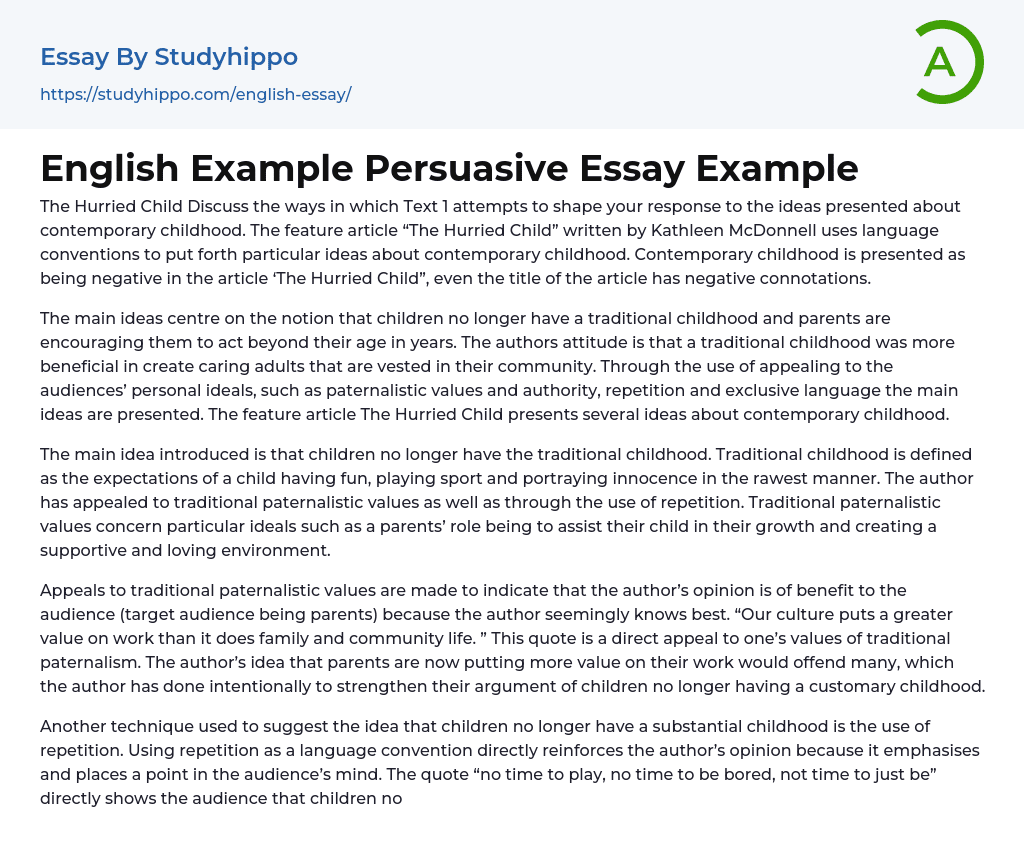In "The Hurried Child", Kathleen McDonnell utilizes language conventions to portray contemporary childhood in a negative light. The article presents the idea that contemporary childhood is negative, evident even in the article's title itself.The article "The Hurried Child" examines the idea that children nowadays are not having a conventional childhood and are being urged by their parents to grow up too fast. The author contends that this is harmful because a traditional childhood helps develop compassionate adults who engage with their community. To convey this viewpoint, the author employs repetition and exclusive language, appealing to the audience's personal values of paternalistic ideals and authority.
The text argues that children no longer experience the conventional concept of childhood, which includes enjoyable activities, sports participation, and pure innocence. The author emphasizes traditional paternalistic values through re
...petition to stress the significance of parents in supporting their children's growth and fostering a nurturing atmosphere.
The author attempts to persuade the target audience of parents by appealing to traditional paternalistic values. By claiming that "Our culture puts a greater value on work than it does family and community life," the author directly taps into the values associated with traditional paternalism. The intention behind this provocation is to strengthen the argument that children no longer experience a customary childhood.
According to the author, children's childhoods have become less significant because of repetition. The use of repetition strengthens the author's argument by highlighting a specific point in the audience's mind. For example, the phrase "no time to play, no time to be bored, not time to just be" effectively emphasizes how children no longer have their own leisurely and
self-directed time.
The author highlights the concept of freedom of time in childhood, which is often associated with children having sufficient playtime and carefree moments while adults handle adult responsibilities. The author uses repetition to emphasize that modern-day children are not experiencing these enjoyable moments as previous generations did when outdoor activities were prioritized over studying. By employing traditional paternalism and repetition, the author strengthens their argument that today's children are deprived of a genuine childhood experience.
The text The Hurried Child predominantly employs appeal to authority to manipulate the audience's belief in the author's statements. This persuasive technique relies on the audience's respect or intimidation towards the authority's knowledge or expertise. The author reinforces their argument on the absence of a genuine childhood for children by including the viewpoint of Psychologist David Elkind. As someone aspiring to become a Psychologist, the author's inclusion of a Psychologist's opinion automatically garners my respect and strengthens their viewpoint in my perspective.
The author's effective appeal to authority aims to convince the audience, a viewpoint that I share. The article, published in March 2002 when I was five years old, likely discusses my generation's childhood experiences. Consequently, I am not fond of the author's use of both inclusive and exclusive language. By using inclusive language, the author strengthens their argument by including certain segments of the audience while devaluing children's opinions.
Inclusive language acknowledges and incorporates everyone, but it can inadvertently exclude certain groups to highlight a particular viewpoint. An example of both inclusive and exclusive language is found in the following statement: "We should avoid thinking that children are simply brainwashed puppets." This
statement appeals to the intended audience (parents and adults) by involving them in the argument, yet excludes children through the use of the word "kids".
In “The Hurried Child,” Kathleen McDonnell argues that children no longer experience a traditional childhood. She employs various language techniques, including invoking authority and paternalistic values, repetition, and exclusive language, to emphasize her main point. McDonnell asserts that a conventional childhood would result in nurturing and helpful adults who actively contribute to their communities. This is the goal we should all aim for.
- Child essays
- Child labor essays
- Childcare essays
- American Dream essays
- Barriers To Entry essays
- Capitalism essays
- Central Bank essays
- Compensation essays
- Consumerism essays
- Economic Development essays
- Economic Growth essays
- Economic Inequality essays
- Economic System essays
- Economy essays
- Employment essays
- Export essays
- Finance essays
- Free Trade essays
- Gross Domestic Product essays
- Human Development essays
- Income Inequality essays
- Industry essays
- Inflation essays
- International Business essays
- International Trade essays
- Macroeconomics essays
- Materialism essays
- Max Weber essays
- Microeconomics essays
- Minimum Wage essays
- Monetary Policy essays
- Monopoly essays
- Pricing essays
- Profit essays
- Recession essays
- resources essays
- Taxation essays
- Trade essays
- Unemployment essays
- Warehouse essays
- World economy essays
- John Locke essays
- 9/11 essays
- A Good Teacher essays
- A Healthy Diet essays
- A Modest Proposal essays
- A&P essays
- Academic Achievement essays
- Achievement essays
- Achieving goals essays




